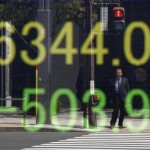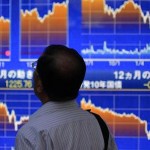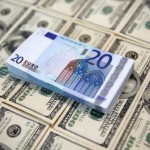Main moves in the markets and key events coming this week; Asian markets early review

Stocks fell in most Asian markets as nations grapple with how to deal with escalating provocations from North Korea. The yen was near its strongest level for the year and U.S. Treasury yields were at their lowest since the aftermath of Donald Trump’s November election win.
Equities slid from Hong Kong to Sydney as traders girded for a potential intercontinental ballistic missile launch by Pyongyang, which will celebrate its “foundation day” Saturday. U.S. stock futures were down slightly after the main gauges dropped overnight, hurt also by the historically powerful Hurricane Irma as it heads toward Florida. Dovish comments from Federal Reserve officials helped propel a surge in U.S. Treasuries and undercut the dollar, with traders increasingly skeptical the central bank will raise interest rates again this year.
The case for a continued risk-off tone was supported by a lack of consensus among the U.S., Russia and China on how to pressure Kim Jong Un to abandon his nuclear ambitions. Russian President Vladimir Putin has rejected U.S. calls for more sanctions, echoing China’s resistance to more punitive measures.
Further volatility may be in store as the North Korea situation evolves. Ruchir Sharma, Morgan Stanley head of emerging markets and chief global strategist, told Bloomberg Television that “markets have a terrible history of pricing in geopolitics.” He predicted “shallow declines,” though not enough to avoid being “taken by complete surprise” in the event of something serious happening.
Away from North Korea, a slew of key economic news will shed light on the state of the global outlook. Mario Draghi may give more clarity on paring the European Central Bank’s bond-buying program when he speaks after a policy decision on Thursday. U.S. durable-goods figures, the trade balance, unemployment claims, and the release of the Fed’s Beige Book will add to the global data deluge.
Meantime, traders are getting their final cues from Fed officials before the Sept. 19-20 policy meeting. Board member Lael Brainard said Tuesday the central bank should be “cautious” about further monetary tightening. Another key rate-setter, New York Fed President Bill Dudley, speaks Thursday. For their parts, uber-dove Minneapolis Fed President Neel Kashkari said rate hikes may be “doing real harm” and Robert Kaplan of Dallas reiterated his view that the Fed should be patient on rates.
Australia’s economy grew less than forecast in the second quarter. GDP rose 0.8 percent from the prior quarter and versus 0.9 percent estimated by economists. The Reserve Bank of Australia left its benchmark rate unchanged Tuesday and Governor Philip Lowe predicted that growth “will pick up from here as the drag from declining mining investment comes to an end.”
The key events coming this week:
- China trade figures are anticipated to show another month of solid export growth, while FX reserves probably continued to rise on stricter capital controls, robust growth and a stronger yuan, according to Bloomberg Intelligence.
- The European Central Bank meets on Thursday. Draghi will express concern over the euro’s strength, but won’t say much about his asset-purchase program’s future, according to a survey.
And here are the main moves in markets:
Stocks
- Japan’s Topix index reversed earlier losses and was 0.1 percent up as of 2 p.m. Tokyo time. The Kospi index in South Korea slid 0.3 percent and Australia’s main gauge was down 0.4 percent.
- The Hang Seng Index declined 1 percent in Hong Kong on low volumes and China’s equity benchmarks were also lower.
- The S&P 500 contracts were little changed after the main gauge sank 0.8 percent. The Dow Jones Industrial Average lost 1.1 percent Tuesday.
- The MSCI Asia Pacific Index dropped 0.4 percent.
Currencies
- The Japanese yen was steady at 108.69 per dollar, within 1 percent of its high for the year.
- The Bloomberg Dollar Spot Index was little changed after falling 0.3 percent Tuesday.
- The Australian dollar climbed above 80 U.S. cents, then retreated to 79.81 after the GDP data.
- The euro was little changed at $1.1914.
- The Swiss franc was also little changed at 0.9549 per dollar.
Bonds
- The yield on 10-year Treasuries was at 2.07 percent. It fell 10 basis points Tuesday, taking it closer to breaching 2 percent for the first time since last November.
- Yields on Australian 10-year bonds tumbled eight basis points to 2.591 percent.
Commodities
- Gold fell 0.1 percent to $1,338.25 an ounce after increasing 0.4 percent to the highest in a year.
- West Texas Intermediate crude lost 0.2 percent to $48.57 a barrel following a 2.9 percent gain.
Source: Bloomberg – Asian Stocks Fall as North Korea Worries Persist: Markets Wrap





























